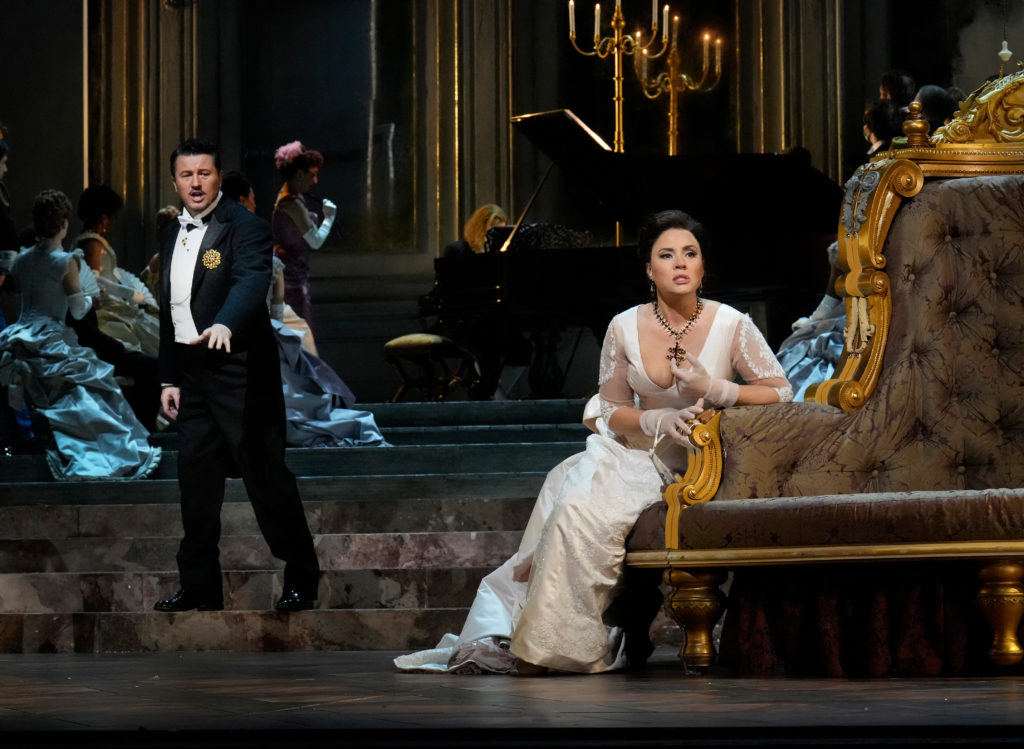VIEWPOINTS – Winter nights at the Metropolitan Opera: Giordano’s FEDORA and Poulenc’s DIALOGUES DES CARMÉLITES
- By drediman
- January 27, 2023
- No Comments
This past week, I had the chance to attend a pair of productions at the Metropolitan Opera before the company takes its newly-instituted February hiatus from performances. Here are my thoughts on these winter evenings at the opera.

FEDORA
Through January 28
One of the most glamorous nights to go to the Met are its New Years Eve gala performances, which have historically unveiled sparkly new productions. For the last month’s gala, the choice was Umberto Giordano’s 1898 opera Fedora. Featuring an Italian libretto by Arturo Colautti, the tragic opera — which hasn’t been seen at the Met in 25 years — is a more somber and dramatic offering than the light-hearted fare that’s typically opted for (e.g., The Merry Widow). The new production is helmed by Met usual suspect Sir David McVicar, who stylishly and efficiently stages the opera on a set that unfolds itself like a Russian nesting doll over the course of the evening. In the title role, soprano Sonya Yoncheva is utterly compelling, carrying the opera with detailed acting (which hasn’t always been the case) and a voice that’s taken an attractively heftier hue as of late. As Fedora’s love interest, tenor Piotr Beczała has similarly stepped up to the plate with a portrayal that’s fully defined and vocally substantial. Maestro Marco Armiliato conducts the mighty Met Orchestra with an impassioned reading of Giordano’s lush score.

DIALOGUES DES CARMÉLITES
Through January 28
Additionally at the Metropolitan Opera, I was able to catch the return of Francis Poulenc’s Dialogues des Carmélites, which tells the devastating story of an order of Carmelite nuns martyred in Paris during the French Revolution. At the center of the opera is the nun-in-training Blanche — played with searing sincerity by soprano Ailyn Pérez (in fine voice) — whose turbulent psychological journey provides the axis around which the piece revolves. A singular opera in several respects, the current revival of John Dexter’s strikingly minimalist staging is an especially potent reminder of the work’s ability to convey tragedy without resorting to histrionics. As such, the work is a satisfying counterpoint to Fedora’s breathless near-melodrama. Joining Ms. Pérez are a bevy of excellent singing actresses, namely sparkling soprano Sabine Devieilhe (in her house debut) as Blanche’s fellow novice Constance, powerful soprano Christine Goerke as the committed Madame Lidoine, mezzo-soprano Jamie Barton as Mère Marie, and mezzo-soprano Alice Coote in a no-holds-barred role debut as Madame de Croissy. Maestro Bertrand de Billy sensitively conducts Poulenc’s understated, evocative score.

 Copyright © 2024
Copyright © 2024
Leave a Reply